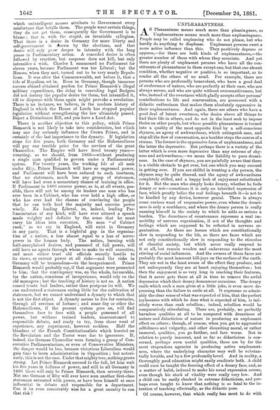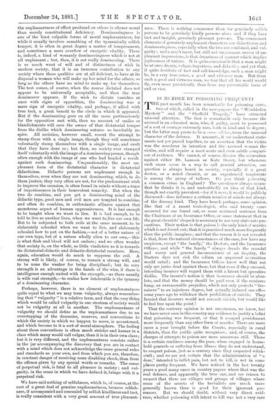UNPLEASANTNESS.
AS Pleasantness means much more than pleasingness, so Unpleasantness means much more than unpleasingness. People may be called unpleasing who do not please, but who hardly do anything to displease. Unpleasant persons exert a more active influence than this. They positively depress or oppress,—for there are both kinds of unpleasantness,—the greater number of those with whom they associate. And yet there are plenty of unpleasant persons who have all the con- stituents of pleasantness in them except one, but that one absent condition, whether negative or positive, is so important, as to render all the others of no avail. For example, there are persons who are profoundly benevolent, who have a good deal of exuberance of nature, who are perfectly at their ease, who are always serene, and who are quite without oversensitiveness, but who, instead of the sweetness which gladly accepts other persons' contributions to life and conversation, are possessed with a didactic enthusiasm that makes them absolutely oppressive in their unpleasantness. And again, there are others who have a good deal of latent sweetness, who desire above all things to find their life in others, and do not in the least seek to impose theirs on other people, but whose possible pleasantness is turned into a quality of the most opposite kind by a self-conscious shyness, an agony of awkwardness, which extinguish ease, and stop all the flow of conversation, as a boulder stops the course of a stream. The former is the oppressive form of unpleasantness, and the latter the depressive. But perhaps there is a variety of the latter which is even more depressive than any extreme of shy- ness and awkwardness,—we mean the liability to pure dreari- ness. In the case of shyness, you are painfully aware that there is a visible obstacle to get over, but one which you may succeed in getting over. If you are skilful in treating a shy person, the shyness may be quite thawed, and the agony of awkwardness completely stilled, and a happy look of enjoyment substituted for it. But the man who simply looks dreary, whether he feels dreary or not—sometimes it is only an inherited expression of face, which greatly belies the real feelings beneath it—is not to be kindled by any device, however genial. There is always some curious want of responsive power, even where the dreari- ness is only a semblance, and where the dreary person is really sunning himself in the society to which he adds so serious a burden. The dreariness of countenance expresses a real im- mobility of nervous organisation, if not of the thoughts and feelings which are supposed to be reflected. in nervous or- ganisation. As there are horses which are constitutionally slow in responding to the bit, so there are faces which are not only constitutionally slow in responding to the stimulus of cheerful society, but which never really respond to it at all, but remain wooden and cadaverous under the most stirring of social influences. And the owners of these faces are probably the most innocent kill-joys on the surface of the earth. They are not in the least aware of the effect they produce, and not unfrequently they are at heart enjoying themselves ; but then the enjoyment is so very long in reaching their features, that it never gets there at all in time to remove the awful depression which their dreary demeanour occasions. The dreary smile which such a man gives at a little joke, is even more de- pressing than the failure to smile at all. It expresses so admir- ably the clear sense of what was expected of him, that the perfect joylessness with which he does what is expected of him, is infi- nitely worse than rank rebellion ; indeed, rebellion would be comparatively stimulating. There are, probably, no perfectly harmless qualities at all to be compared with dreariness of nature and didacticism of nature in producing an unpleasant effect on others ; though, of course, when you get to aggressive selfishness and vulgarity, and other disuniting moral, or rather immoral, qualities, you go farther, and fare worse. But in relation to purely innocent, and so far as didacticism is con- cerned, perhaps even useful qualities, these are by far the most stupendous agencies in producing active unpleasant- ness, where the underlying character may well be substan- tially lovable, and by a few profoundly loved. And in reality, a thoroughly good education might easily eradicate both. A child could soon be taught the freezing effect of a dreary face, and, as a matter of habit, induced to make his usual expression serene, even though his stock of vitality were really very low. And a child can be easily checked in extreme didacticism, and per- haps even taught to know that nothing is so fatal to the in- tention of teaching effectually, as the didactic pose.
Of course, however, that which really has most to do with
the unpleasantness of effect produced on others is oftener moral than merely constitutional deficiency. Domineeringness is one of the least culpable forms of moral unpleasantness, for while it usually involves something of the tyrannically selfish temper, it is often in great degree a matter of temperament, and sometimes a mere overflow of energetic vitality. There is, indeed, a kind of womanly domineeringness which is not at all unpleasant ; but, then, it is not really domineering. There is so much want of will and of distinctness of wish in modern society, that it is an immense contribution to any society where these qualities are at all deficient, to have at its disposal a woman who will make up her mind for the others, so long as the others have no mind to make up for themselves. The test comes, of course, when the course dictated does not appear to be universally acceptable, and then the true domineerer appears. If the wish to dictate vanishes at once with signs of opposition, the domineering was a mere sign of energetic vitality, and perhaps, if allied with true tact, a great benefit to the circle in which it appeared. But if the domineering goes on all the more pertinaciously for the opposition met with, then no amount of smiles or blandishments will save the owner of that dictatorial temper from the dislike which domineering natures so inevitably in- spire. All societies, however small, resent the attempt to stamp them with a single image, though they will sometimes voluntarily stamp themselves with a single image, and exult that they have done so ; but then, no society ever stamped itself voluntarily with the image of a domineering person, though often enough with the image of one who had headed a revolt against such domineering. Unquestionably, the most un- pleasant form of the dictatorial character is dictatorial didacticism. Didactic persons are unpleasant enough in themselves, even when they are not domineering, which, to do them justice, they very often are not, for the predominant wish to improve the occasion, is often found in minds without a trace of imperiousness in their benevolent tenacity. But when the two do combine, and you get a domineering mind of the didactic type, good men and evil men are tempted to combine, and often do combine, in enthusiastic alliance against that monstrous aspect of human oppressiveness. It is bad enough to be taught when we want to live. It is bad enough, to be told to live as another lives, when we want to.live our own life. But to be subjected to both evils at the same moment, to be elaborately schooled when we want to live, and elaborately schooled how to put on the fashion,—not of a better nature of our own type, but of a nature wholly alien to our own,—this is what flesh and blood will not endure ; and we often wonder that society is, on the whole, so little vindictive as it is towards its dictatorial-didactic and didactic-dictatorial members. Here, again, education would do much to suppress the evil. A strong will is likely, of coarse, to remain a strong will, and to be none the weaker for being disciplined; but its very strength is an advantage in the hands of the wise, if there is intelligence enough united with the strength,—as there usually is with real strength,—to realise how intolerable is the tyranny of a domineering character.
Perhaps, however, there is no element of unpleasantness quite equal to what we may term vulgarity, always remember- ing that " vulgarity " is a relative term, and that the very thing which would be called vulgarity in one stratum of society would not be vulgarity at all in another. The unpleasantness of vulgarity we should define as the unpleasantness due to an overstepping of the decencies, reserves, and conventions to which the society in which we happen to move, is accustomed, and which become to it a sort of moral atmosphere. The feeling about these conventions is often much stricter and keener in a class which many would call vulgar, than it is in their own class ; but it is very different, and the unpleasantness consists rather in the jar accompanying the discovery that you are in contact with a mind which does not acknowledge the same general rules and standards as your own, and from which you are, therefore, in constant danger of receiving some disabling shock, than from the offence given by any special words or remarks. The sense of perpetual risk, is fatal to all pleasure in society ; and vul- garity, in the sense in which we have defined it, brings with it a perpetual risk.
We have said nothing of selfishness, which is, of course, at the root of a great deal of genuine unpleasantness, because selfish- ness, if accompanied and concealed by selfish kindliness and tact, is really consistent with a very great amount of true pleasant- ness. There is nothing commoner than for genuinely selfish persons to be genuinely kindly persons also ; and if they have tact and insight, genuinely pleasant persons. The commonest elements of genuinely unpleasant characters are didacticism and domineeringness, especially when the two are combined, and vul- garity ; and a much rarer, but still not uncommon. source of un- pleasant impressions, is that dreariness of manner which implies joylessness of nature. It is quite conceivable that a man might be at once dreary, vulgar, imperious, and didactic ; and yet that, if quite destitute of tact and self-knowledge, such a man might be, in a very true sense, a good and virtuous man. But from such a good and virtuous man, we fear that all his world would fly, even more persistently than from any prA.,entable form of evil or vice.







































 Previous page
Previous page